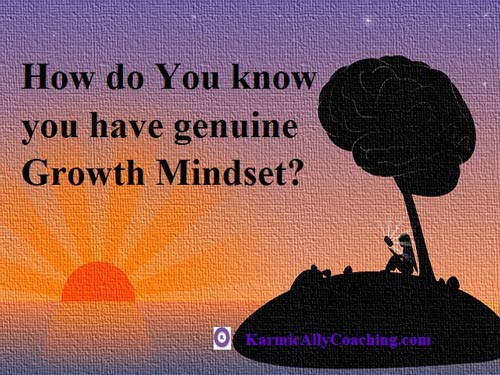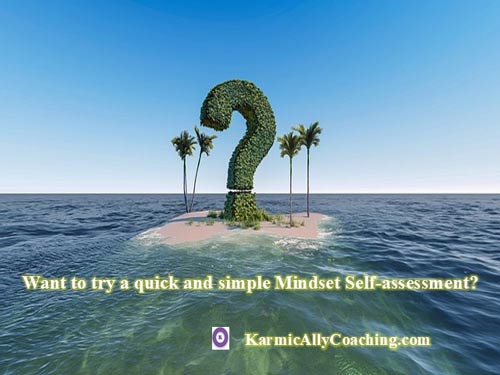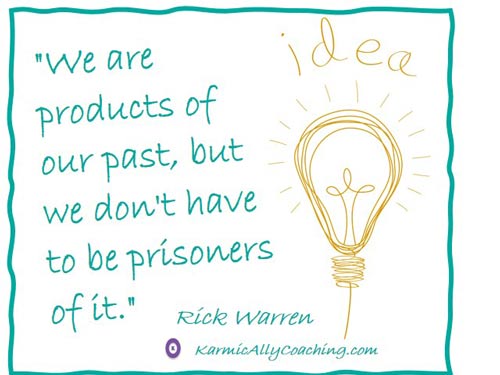This post has already been read 1166 times!

In my previous post Want Success? Get out of the Fixed Mindset Trap, I waxed eloquently on the virtues of having a Growth Mindset and why it was important to develop it for personal and professional success.
But it’s not all that simple. In any journey to a destination you need to know where you’re starting from and where you’re heading.
It’s also not all that black and white and there are shades of grey to be considered.
For example, in my post We’ve always done it that way – positive perspective, the first impression I got when working with the employees was they had a fixed mindset.
As my assignment progressed, I realized these workers had never known anything new and while there was the odd man or two who wasn’t willing to accept change, the majority either had a growth mindset and were willing to share ideas to make the system at the lodge work better or were more growth oriented than fixed in their views.
Which brings me to an important point that I have touched on in my previous post on mindset.
Everyone’s attitude and outlook exist on a continuum whose ends are either fixed or growth ways of thinking.
In her book Mindset: The New Psychology of Success, Dr. Carol Dweck describes different ways to approach learning.
She places individuals on a continuum according to their implicit views of where ability comes from. Some believe their success is based on innate ability; in Dweck’s vision, they have a “fixed mindset.”
Others, who believe their success is based on hard work, learning, training, and perseverance are said to have a “growth mindset.”
It would be hard to be truly fixed in your way of thinking, but there are probably plenty of people who are.
Likewise, being completely oriented toward growth is also perhaps not realistic. And, over time, you may move more toward one end of the spectrum or the other, depending on your situation.
While you may think you have a growth mindset, the chances are that you still hold on to a lot of beliefs associated with fixed ways of thinking.
The more you recognize those elements of your thinking that are fixed, the more you can work on adjusting these and looking for ways to improve yourself.
For example, if your boss at work criticizes your work, how do you react?
Do you start to think that there’s no point in trying because no matter what you do, you’re going to fail at meeting your boss’s expectations and decide to do nothing out of fear of more criticism?
Or will you accept the fact that perhaps you goofed up and while the level of criticism was a wee bit too harsh, it’s a challenge for you to learn something new, reassess what was lacking and do better next time?
That’s the difference in approach for the 2 mindsets.
Not sure where you line up on this continuum? You can assess yourself using a simple tool called the Mindset Assessment.
This easy diagnostic instrument comes from research-validated measures of people over the age of 12 and can be used to give a simple evaluation of your current mindset.
Many researchers have used this same tool in their studies on mindset and learning.
Want to try a quick and simple Mindset Self-assessment?

For each of the following questions, indicate if you Strongly Disagree, Disagree, Agree, or Strongly Agree.
Keep track of your answers for each, and we will tally up your score at the end.
- No matter how much intelligence you have, you can always change it a good deal.
- You can learn new things, but you cannot really change your basic level of intelligence.
- I like my work best when it makes me think hard.
- I like my work best when I can do it really well without too much trouble.
- I like work that I’ll learn from even if I make a lot of mistakes.
- I like my work best when I can do it perfectly without any mistakes.
- When something is hard, it just makes me want to work more on it, not less.
- To tell the truth, when I work hard, it makes me feel as though I’m not very smart.
Now, look at your answers for statements 1, 3, 5, 7. These are statements that are more indicative of a growth mindset. If you tend to agree with these, you fall closer to that end of the mindset continuum.
The other statements, #2, 4, 6, and 8, all fall toward the fixed mindset end of the continuum.
Agreeing with these shows that you have a more fixed outlook on your ability to change and grow.
Now that you know where you fall on the continuum, what should you do with this information?
The next section includes hints, tips, and strategies for learning to cultivate a growth mindset and to adopt a more growth-oriented approach to your life.
Prepare to transform your Mindset for Success
Before you decide that you need to adopt a growth mindset or that you are ready to work on your attitude, it is essential to understand the full scope of just how much your fixed ways of thinking are affecting you and your life.
You may not even realize how deeply rooted your attitude is or the reaches of its influence.
Exploring the influence of your mindset before you begin to change it will help you fully understand it, to identify the many ways it influences your beliefs and actions, and to identify how it affects your ideas about yourself.

Taking the time, in the beginning, to be honest about your mindset and how it is affecting your life now will make it easier to devise a plan for how best to address the necessary changes in the future.
This begins by starting to listen to your inner voice. We all have a running monologue inside our brains that is always talking, always telling you what to do or how to feel about yourself and life in general.
This voice represents your mindset, and when you start to listen, you will hear evidence of your beliefs.
Who is your voice affecting your beliefs about yourself? How is your self-esteem influenced by the words of this voice?
How do you talk to yourself? What types of decisions does your voice affect?
What is your voice telling you to do or not to do? What sorts of limiting beliefs do you hear?
When you start this exploratory phase, it can be constructive to write down what you are hearing. Recording this evidence can help you identify the specific ideas you need to work on changing as well as patterns of behavior that are directly affected by these beliefs.
In fact, reading back the words you use to talk to yourself can be a compelling motivator for changing your attitude.
Take time to process your evidence. What does this say about your beliefs, about what you have believed for many years, and how you treat yourself as well as others? What lessons can you learn from these words and this evidence?
Let this sit for a while and return to it after you have had some time to think. Reflect on what you can learn, and you will use this later to help you set some goals for yourself.
This journal can be essential for you to review throughout your journey toward developing a new mindset, not just in the beginning. Return to the practice of reflection and recording evidence of your outlook again and again.
Get in the habit of listening to that voice and thinking about what it is saying. Do not stop doing this just because you start developing new habits. It should be something you do for the rest of your life.
Now that you know what you are facing, it is time to make a conscious choice to change your mindset. Set an intention for the type of mentality you would like to adopt. Write down the reasons why you are doing this.
Be concrete and include outcomes that you can see or measure, so you know what success will look like. Then, reset your intention every morning when you wake up. Commit each day to your new way of thinking and to adopting new vocabulary and behaviors.
This worksheet will aid you in this exercise.
Now that you see how your mindset is affecting you, you are ready to make a plan for your personal development. In this phase, you will use specific strategies and tips to work on getting rid of your old, fixed ways of thinking and embrace healthier, growth-oriented thoughts and actions.
Next, we provide a list of strategies that can help you do just that.
4 Tips to nurture a robust Growth Mindset
I covered 7 ways to start developing a Growth Mindset in my previous post and here I’m providing 3 more tips you can use to create an environment that values learning and growth.
These tips can be used with adults, young adults, or even children, and can be modified depending on the age of the person.
Reframe how you talk to yourself or about yourself
When you notice phrases like “I’m no good at this” come out of your mouth or that of your child, take a minute to consider alternatives. In fact, you can create a list of other options to keep handy so that you or your child can look back at it when this type of fixed language pops up.
Your list of alternatives could include adding the word “yet” to your sentence, “This could take some time to solve,” or looking for other strategies to try instead of giving up. This list is great to post in the area of your home where your child does homework if they are struggling at school.
Think about your thinking
Known as metacognition, thinking about your thoughts and strategies can help you develop a growth mindset.
When faced with a new project that you know will stretch you, don’t give in to the fear that you might fail. Instead view this as a learning opportunity where you will get a chance to polish your existing skills and learn new ones along the way which can be used in future.
When you solve a problem, stop to consider why you chose those methods, what would you do differently next time, and what you can learn from this exercise.
If you need more inspiration or ideas, check out my post on 7 simple ways to improve your out of the box thinking skill and also download the free checklist.
Repeat daily affirmations
Affirmations are one way to rewire your subconscious in favor of your new mindset. An affirmation is a statement written in the present tense but represents the reality you are striving for.
For example, you would say, “I learn from my challenges and become a stronger person.” Write out three that are meaningful to you on your journey to a growth mindset and repeat these aloud to yourself every morning and every evening.
Some people prefer to write out their affirmations instead of speaking them aloud.
Concluding Thoughts on the topic of Mindset
Your mindset is a product of what you learn over time, and what informed you as a child is still within you. If you want to change your mindset, then you must practice your new, more positive thoughts and actions, repeatedly making a new neural pathway that rewires your brain’s automatic thoughts and patterns.
By recognizing your mindset is somewhat fixed and how that way of thinking is influencing your behavior, you can do something to change it all.
Becoming aware is the first step but acting and being consistent is the most critical part of your attitude transformation plan.
Being more conscious about your actions, words, and thoughts is essential. Learning to pay attention to how you speak to yourself and others, how you react in situations, and what makes you feel happy and successful are important.
Embracing new things, taking small risks, and practicing your new mindset every day will be crucial.
Stick with your hard work because change is difficult. But it is worth it in the end when your new growth mindset can help you reach your goals and realize your full potential.
Remember why you chose this path and the reasons you have decided to adopt a new way of thinking.




 I adhere to the Certified Coaches Alliance Code of Ethics and Standards. A copy is available on request.
I adhere to the Certified Coaches Alliance Code of Ethics and Standards. A copy is available on request.
 Email:
Email:
Thank you for sharing this awesome post V! The information here is something I need to absorb as do many others. Thank you for your guidance here!
You’re welcome, Zeenat!My intention with the Mindset posts was to raise awareness of the 1 area that stumps a lot of us when it comes to growth and development.
Such an interesting and well informed post. I don’t mind hard or challenging as long as I’m interested in the subject matter. Accounting is hard and I’m so glad there are people who love accounting and balance sheets. 🙂
Thank you Peggy. Being interested in the subject matter is important if one intends to consolidate learning and then applying the new knowledge.